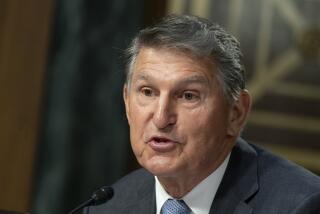Geithner said to consider leaving Treasury after debt debate
- Share via
Treasury Secretary Timothy F. Geithner has signaled to White House officials that he’s considering leaving the administration after President Obama reaches an agreement with Congress to raise the national debt limit, according to three people familiar with the matter.
Geithner hasn’t made a final decision and won’t do so until the debt ceiling issue has been resolved, according to one of the people. All spoke on condition of anonymity to discuss private discussions.
The Treasury secretary has said the U.S. risks defaulting on its obligations if Congress doesn’t raise the $14.3 trillion debt ceiling by Aug. 2. The administration and congressional Republicans are at an impasse in negotiations to raise the limit, which also is tied to efforts to cut the nation’s long- term deficit.
Moody’s Investors Service said on June 2 it expects to place the U.S. government’s Aaa credit rating under review for a possible downgrade if there’s no progress on the debt limit by mid-July. Fitch Ratings said June 21 it would place the U.S. on a negative rating watch if no action is taken by Aug. 2.
An exit by Geithner would complete the turnover in Obama’s original economic team, with Council of Economic Advisers Chairman Austan Goolsbee scheduled to leave in early August to return to the University of Chicago.
That would leave Obama with two key posts to fill as Republicans are seeking to turn the 2012 election into a referendum on Obama’s handling of the economy and the recovery is slowing. The unemployment rate rose to 9.1 percent in May, according to the Labor Department, and the U.S. economy grew at a 1.9 percent pace in the first quarter, according to Commerce Department figures released June 24.
Geithner, 49, has told associates that he needs a break from government service after dealing with the turmoil that followed the collapse of Wall Street firms including Bear Stearns Cos. and Lehman Brothers Holdings Inc., first as president of the Federal Reserve Bank of New York and then as Obama’s treasury secretary.
Family considerations also are playing a role in Geithner’s deliberations, according to the people. His son has decided to finish his final year of high school in New York.
If Geithner does leave the administration, Obama would be losing a member of his economic team who understands Washington institutions and the New York banking world as well the intricacies of the Chinese economy. Geithner has pressed the Chinese to let their currency appreciate faster to reduce the global imbalances that both he and Obama have blamed for financial uncertainty.
After Obama’s victory in the 2008 election, Geithner had a rocky start in Washington as he faced Senate scrutiny over his failure to pay self-employment tax returns while he worked at the International Monetary Fund. He paid some of the taxes after being audited by the IRS and didn’t pay the rest until it was clear he would be nominated for the Treasury post, according to the Senate Finance Committee.
His initial moves to return financial markets to health were rebuffed by Wall Street. On Feb. 10, 2009, when Geithner unveiled a plan to bolster the banking system, the Standard & Poor’s 500 stock index tumbled 4.9 percent.
As Obama’s presidency progressed, and the economy began to recovery, Geithner’s stature grew.
“Tim was very influential from day one,” said former CEA chairman Christina Romer. “In some sense, his public persona has just caught up with what has always been true inside the White House.”
In addition to Goolsbee, who announced his decision to return to the University of Chicago earlier this month, three other top Obama economic advisers already have departed. At the CEA, Goolsbee replaced Romer, who returned to teaching at the University of California at Berkeley last September. National Economic Council Director Lawrence Summers and Office of Management and Budget Director Peter Orszag left the administration last year. Summers returned to Harvard University, and Orszag is now vice chairman of global banking at Citigroup Inc.
Geithner earned a bachelor’s degree from Dartmouth College in Hanover, N.H., and a master’s degree from Johns Hopkins University’s School of Advanced International Studies in Washington, D.C. After graduate school, he worked for three years at a global consulting firm founded by Henry A. Kissinger.
More to Read
Inside the business of entertainment
The Wide Shot brings you news, analysis and insights on everything from streaming wars to production — and what it all means for the future.
You may occasionally receive promotional content from the Los Angeles Times.










